Daphne Caruana Galizia: The key figures in Malta's crisis over her murder
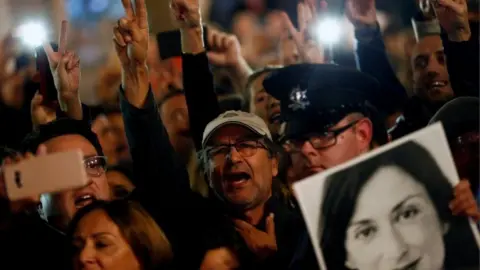 Reuters
ReutersMaltese Prime Minister Joseph Muscat has announced he will resign in the new year amid street protests over the investigation into the murder of a journalist in 2017.
Daphne Caruana Galizia relentlessly investigated corruption, which she alleged ran deep into her country's politics, before she was killed by a car bomb close to her home.
Four people have been charged over her murder while an alleged middleman was granted immunity in exchange for evidence.
Here is a guide to the key figures involved.
The victim
Daphne Caruana Galizia was described when she died aged 53 as one of Malta's most important, visible and fearless journalists.
She ran a popular blog, Running Commentary, which investigated allegations of corruption and other criminal wrongdoing which she alleged ran into the highest levels of government. Those who ordered the bomb attack on her Peugeot 108 wanted to "shut her up", her sister Corinne Vella said later.
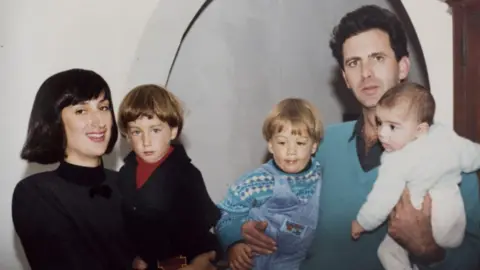 Getty Images for the Daphne Project
Getty Images for the Daphne ProjectBefore her death, she had been reporting on allegations relating to the Panama Papers - a mass of documents leaked in 2016 from a Panamanian law firm. The documents revealed that two of Prime Minister Muscat's close associates were involved in secret offshore business. One was his chief of staff, Keith Schembri, and another a minister, Konrad Mizzi. There is no evidence of money changing hands.
Caruana Galizia's murder - bearing the hallmarks of a contract killing - shocked not only Maltese society but also European human rights figures who criticised Malta's handling of the investigation.
Her family have led the calls for justice, including pushing for a public inquiry.
They have also revealed that they suffered years of intimidation, including the murder of three pet dogs, because of her reporting.
The four men charged
According to a Reuters news agency investigation, the attack earned the killers €150,000 (£128,000; $165,000).
Brothers George and Alfred Degiorgio and their friend, Vince Muscat, were arrested soon after the murder on suspicion of planting and triggering the device.
They were charged with voluntary homicide, possession and detonation of an explosive, and forming part of a criminal organisation. All three men pleaded not guilty at a pre-trial hearing.
Vince Muscat, who is no relation of the prime minister, has sought a presidential pardon in return for information, according to reports.
Maltese businessman Yorgen Fenech has been charged with complicity in the murder. He pleaded not guilty to that charge and four others others including membership of a criminal gang.
A well-known figure in Malta, he has served as head of the Tumas business group and a director of energy company Electrogas but recently resigned from both positions.
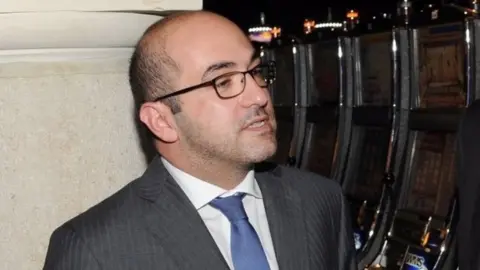 Reuters
ReutersLast year he was identified as being the owner of a mysterious Dubai-registered company, 17 Black, listed in the Panama Papers.
Caruana Galizia had written about 17 Black eight months before her death, alleging it had links to both Keith Schembri, the prime minister's chief of staff, and Tourism Minister Konrad Mizzi. The two men resigned on a day of drama on 26 November and both deny wrongdoing.
Mr Fenech was arrested after his yacht was intercepted on 20 November - he was reported to have offered police information that could "bring the house down".
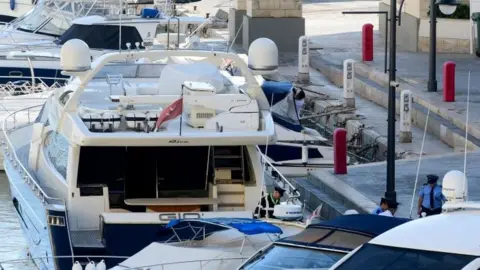 AFP
AFPIn a failed request for a pardon, Mr Fenech's lawyers offered information involving Mr Schembri, Mr Mizzi and Economy Minister Chris Cardona.
Maltese media allege Mr Fenech was familiar with Melvin Theuma, an alleged middleman in the murder who worked as a taxi driver at his apartment building.
The 'middleman'
The only figure who has secured a pardon is Mr Theuma, a taxi driver with links to criminal enterprises.
He was arrested in November in connection with a separate anti-money laundering investigation but offered police information about the 2017 murder in exchange for immunity from prosecution.
He was recommended for a presidential pardon by Prime Minister Muscat, who previously said one would only be offered if the evidence could be corroborated and would stand up in court.
Maltese media reported that he allegedly had evidence, including audio recordings, to support his claims.
His pardon prompted a flurry of developments and he had been due to give evidence in court about the murder, but that session was postponed.
The government figures
The prime minister's chief of staff and the tourism minister resigned, and the economy minister briefly suspended himself.
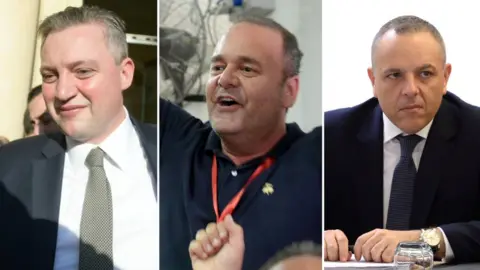 AFP
AFP- Keith Schembri
The former chief of staff was the subject of Caruana Galizia's last blog post minutes before her death. Caruana Galizia alleged he had benefited from secretive shell companies.
His arrest this week was the moment that the police investigation drew close to members of Joseph Muscat's government.
Police released him late on Thursday announcing he was no longer viewed as a person of interest, to the fury of the late journalist's family.
- Konrad Mizzi
Mr Mizzi was removed from his post as health and energy minister in 2016 after it emerged that he had set up a company in Panama. Mr Mizzi said he had merely made arrangements for managing family assets and had done nothing wrong.
In his health role he oversaw the part-privatisation of Malta's health service. He was later made tourism minister but stepped down this week saying it was his duty to allow Mr Muscat's government to continue.
- Chris Cardona
Although Mr Cardona was not named in the papers, he was recently approached by police for "further clarifications" and said he was stepping aside as economy minister in the national interest. He too had been a subject for Daphne Caruana Galizia's blog and was suing her for libel at the time of her death. He too denies wrongdoing. He was reinstated on 1 December.
The prime minister
Joseph Muscat, head of the Labour Party, has been prime minister since 2013.
He will stand down after the process to pick a successor begins on 12 January.
"Malta needs to start a new chapter and only I can give that signal," he told the nation on TV.
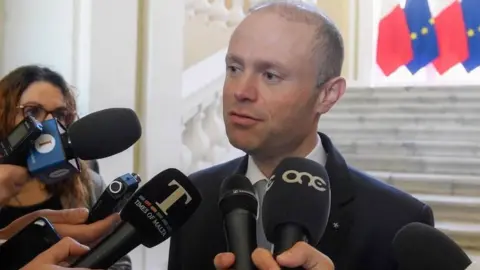 AFP
AFP